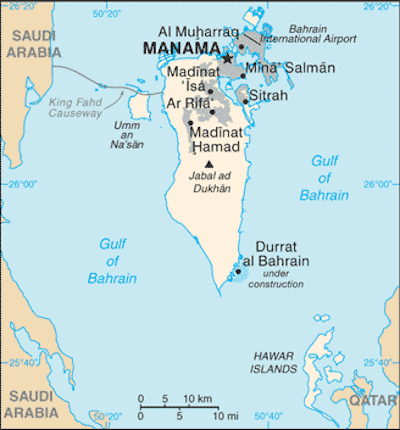Nearly four and a half decades after withdrawing from its protectorate in August 1971 and turning over its naval base to the United States Navy, the United Kingdom has decided to return to Bahrain with a new permanent base for Persian Gulf activities.
Bahrain, a small oil-producing island nation in the Persian Gulf with a little over twice the land area of the City of Las Vegas, is the permanent home of the U.S. Navy’s 5th Fleet and U.S. Naval Forces Central Command. The country is much smaller but almost as populous as neighboring Qatar (the Gulf’s power-hitting, influential media hub and state terror sponsor.) Bahrain upgrade itself from an emirate to a kingdom back in 2002 and had repeatedly introduced pseudo-democracy without true reforms.
Back a few years ago, during the early 2011 failed Arab Spring uprising in the capital of Bahrain, suppressed eventually with the help of Saudi/UAE Gulf Cooperation Council troops, there was a lot of concern (probably correctly) that the United States was declining to get involved — in any capacity — because of its military base in the country. (And probably also because the protesters were likely somewhat aligned with Iran.)
But there is an a far, far longer history of support for violent autocracy in Bahrain by the United Kingdom. And that might be exactly what’s going on now. Former UK Ambassador to the United Nations, Sir Jeremy Greenstock, commended Britain for re-establishing a permanent military presence in Bahrain with the following explanation:
“It will also make it more difficult for some internal cell in Bahrain or UAE or wherever to think they can have a go at the local government if they see some highly trained and capable people standing alongside the government”
In other words, Greenstock believes this military presence will be vital to protect the repressive minority Sunni monarchy of Bahrain from its own population, which is majority Shia.
The unpopular ruling family of Bahrain — originally hailing from southern Iraq in the 18th century — was first explicitly propped up by Britain in an 1868 treaty, after which the British Empire repeatedly suppressed uprisings against the ruling minority. With the discovery of major oil reserves, this became even more important to the British government.
After the 1971 independence agreement (and the base transfer to the United States), the United States has absorbed the role of de facto protector of the ruling family, via extensive heavy arms sales and turning a blind eye during the repeated suppression of protests and uprisings happening just beyond its base perimeter.
Now Bahrain’s rulers can count on not one but two major Western military powers to have their back, in addition to support from Saudi Arabia and the United Arab Emirates.

Map of Bahrain (Credit: CIA World Factbook)


